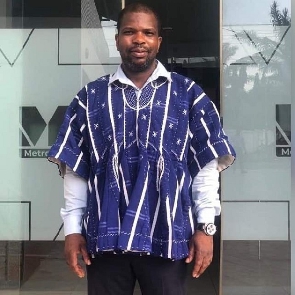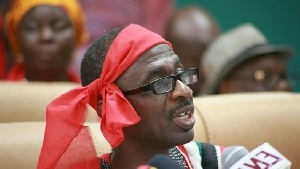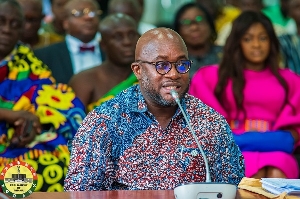Opinions of Thursday, 23 November 2023
Columnist: Manaseh Mawufemor Mintah
The NDC must bring back the Electoral College System
When well-meaning people sit down unconcerned because a system that has been
put in place either benefits them or prevents them from making sacrifices that could dislodge their grip on political power, the effect is that there will be some induration that will at the end of it all cripple the sustainability of future generations.
I have listened to an audio recording purportedly made by one sitting MP in Ghana in which he probably was wading off political threats from his competitors and, in doing so, made the damning declaration that he had stacks of American dollars in waiting to buy votes.
While this kind of statement is detrimental to the growth and sustainability of our democracy, I am here to lay credence to the fact that this is the sad truth spoken by the MP. Anyone threatening to make the MP lose his seat due to this statement may be looking strictly at the severity of the information without giving way to its culminating truth and verisimilitude.
Having contested for an MP position a few months ago, I am here to provide you with my take on what I think should be the most crucial debate right now concerning the future of the NDC party. Political office campaign is expensive! Ours is modeled on the American system of government, so I will start from here. In America, over a third of members of Congress are billionaires ( they are from generational wealth backgrounds), and two-thirds of Congress members graduated from the Ivies.
That tells you that most seats in parliament, and this case, the Senate, have been transferred among family members, much like the wealth that keeps passing through the same family lines. A week before the NPP flagbearer elections, someone asked me, “What at all did Nana Addo see in Dr. Osei Akoto and made him agriculture minister for him, Akoto, to think he has the intellect and the persona even to become the president of Ghana?”
My response was my usual narrative of a historical anecdote. “You know,
Dr. Akoto’s father was Baffuor Osei Akoto, that powerful chief linguist of Agyemang Prempeh. He is a royal, you know… His father was the founder of the Northern People’s Party, the parent of the NPP as we have it today. He was a very astute Gold Coast lawyer, too. I am more than sure; the chickens have just come home to roost.” In politics, people always ride on money, goodwill, and the names of their parents and predecessors and use them to their advantage. It is everywhere!
Meanwhile, American society is entirely different from that of Ghana. Even when
there are the Kennedys, Bushes, Romneys, Cuomos, and Adams in American politics, the literacy rate and political activism of the American populace make it
possible that their nomination bids do not tend to become an imposition on the will of the people. The same cannot be said about Ghana, where the election into the political office of people from rich or political backgrounds has always been a passive or active imposition by the political party to which they belong.
As I have already said, the reason is not because of money or political influence per see, but because the free-thinking society that should hold all men and women who commit to representing them the absolute check of responsibility and that of qualification do not fully possess that level of literacy and understanding of the political system and its ramifications on their actions and inactions.
Therefore, through intimidation, lies, and vituperations, the party hierarchy imprints its will on the people by playing the money or political background cards.
That is not to say that in our democracy, delegates do not know what they want. The truth is that due to the high level of illiteracy, most of our representatives do not fully understand what they think they want in an elected official! In essence, their version of “understanding” is limited. Instead of the political party guiding and informing their choices, the party has become a conduit, hijacked by some officials, who use money and their political influence to impose candidates on the electorate. That is the truth.
Our political parties must not only become election “corn mills” that churn out
candidates to win political power when, but for the influence of the party hierarchy and material opulence, such candidates do not in a very spirited way possess what it takes to be accepted by a well-informed populace and be able to contribute solidly to the development of their respective communities.
Our political parties must be concerned about the caliber of people leading and spearheading their agenda and political future. So that during elections, when delegates cluster around the candidate who is the highest bidder, ostensibly for the need for bread and butter, the party can circumvent that process and put in mechanisms that will not compromise the sanctity of the elections and the caliber of elected officials.
For me, the NDC must do a common fix. Revert to the enlarged Electoral College
system with some checks put in place. I remember that after the defeat of the late ET Mensah and some Northern stalwarts in the 2015 parliamentary primaries, the party quickly returned to this delegates' system. Their reasons? The substantive ones are two. The first is that the electoral college can dislodge experienced MPs in parliament, such as in the case of ET Mensah, and produce MPs who get elected by popular acclamation but would become dabblers and dilettantes in parliament!
I think that this is not a strong argument. After all, when proper accountability is done, and the people whose collective interest an MP serves can see and feel the effects in their lives, how can we come to such a conclusion that such an MP would lose his or her seat to a novice; therefore, he needs a system that would protect him or her in a way? Are we to conclude that with all the excellent work and services provided by one of our own, Hon. Samuel Ablakwa, to the people of North Tongu, once the NDC chooses to enlarge its electorate college, Sammy would lose his parliamentary seat to a novice; therefore, such an outcome is disingenuous to the political fortunes of the NDC? Well, that is a hollow argument, so to speak. The Ewes say a good foodstuff in the market sells itself!
The second and more compelling reason some people also pointed to me is that the
electoral college can lead to the proliferation of candidates who would leverage their popularity and, or the large population of their base (hometowns/ residence) to win parliamentary elections. This fear stems from the assumption that our democracy is on the faultlines of tribalism, intra-ethnic jingoism, cronyism, nepotism, you name them! While I have no reservations about this fear, I am sure it is borne out of the same reasons I have hitherto enumerated, including the fact that the political party itself has made it to fester.
Of course, there are different types of electoral college systems, and the blanket type of system that the NDC introduced some time ago included allowing every registered party member to vote in the parliamentary elections. Any parliamentary candidate with the simplest majority of votes cast becomes elected as the winner of the polls. Such a college system does not help prevent the fears and suspicions of this second group of people without hope in the electoral college system. Instead, the party must consider a different type of college system closely resembling the American senatorial system. In the American system, each electoral district has a weight of votes that is arrived at, considering the population and landmass of that electoral district.
Each weighed electoral district vote is added, and the candidate with the most weighed votes, not the popular votes, is declared the winner of the senatorial
primaries. This way, the fear of some populist using the system to his or her
advantage is drastically assuaged. Similarly, we have nine communities in North Dayi Constituency, with some as small as a hundred NDC registered members. In contrast, the largest town, Anfoega, may have over three thousand registered members of the NDC.
A parliamentary candidate who happens to be from one of the larger towns, when contesting the elections under the American collegiate system, in principle, may not be able to hijack the polls by using his money, popularity, and, or the population of his or her hometown much to his advantage but to the detriment of the rest of the candidates. The NDC must revert to the enlarged electoral college system in electing people representing the party in at least national, regional, and constituency elections.
It has far-reaching effects on future generations since the youth ought to decide the destiny of this party. As a result, I suggest the party adopt an electoral college system that mirrors the American system but with some modifications. Ours must be a college based solely on population, landmass, and total number of registered party members. The weighted votes of each town, whether big or small, must be determined by the landmass of that town, divided by the town's total population, and the result multiplied by the number of registered members of the party in that town.
This is not a perfect system, but at least it will take care of most of the evils that have since bedeviled the delegates' system. Let’s do the math! North Dayi constituency sits on a total landmass of about 460 Square Kilometers. Say, the entire landmass of Wusuta, one of the nine communities of North Dayi, is 56 Square Kilometers, the total population is 9,000 people, and the total number of registered members of the NDC in Wusuta is 1400 people. The weighted electoral college of Wusuta must be determined to be 8.
Assuming, again, that the total population of Blada Tornu, the smallest of the nine communities by landmass and population, is 100 people, her landmass is 1 square kilometer, and the number of registered members of the NDC therein is 50. Her weighed electoral college votes must be 0.5, and so on. It is my considered opinion that this type of college system accounts for differences in population and landmass and makes some logical conclusion that a community with a large landmass will produce quite a more significant number in terms of overall population, and a higher population will inadvertently produce a higher number of registered voters of the party.
Even when a candidate wins massively in the most populous towns and communities, they may still take only the weighed electoral college votes ascribed to them from those towns. When these weighed electoral colleges become known to everyone even before the elections, it makes nonsense of who is a populist or who will attempt to influence the election system overall since the three most dangerous incentives to doing that- populism, money peddling, and political infiltration will be dealt a big blow.
Let me take you back to Athenian democracy. Once in Athenian history, there was a man named Pisistratus, a poor man he was. He was not born into a Greek oligarchy. He did not own any property but burrowed holes and fought his way into the Olympic games in Athens. Upon arrival, he became relatively well-known in Greek society and later staged a political bid for a senate seat. This was when the Athenian Senate was in the hands of absentee landlords and powerful oligarchs. Still, Pisistratus succeeded in breaking through because of the powerful and collective will of the common people.
Ours must be a forward-looking democracy, capable of giving the younger generation a chance rather than protecting wrinkled, old faces who have outlived their importance.













